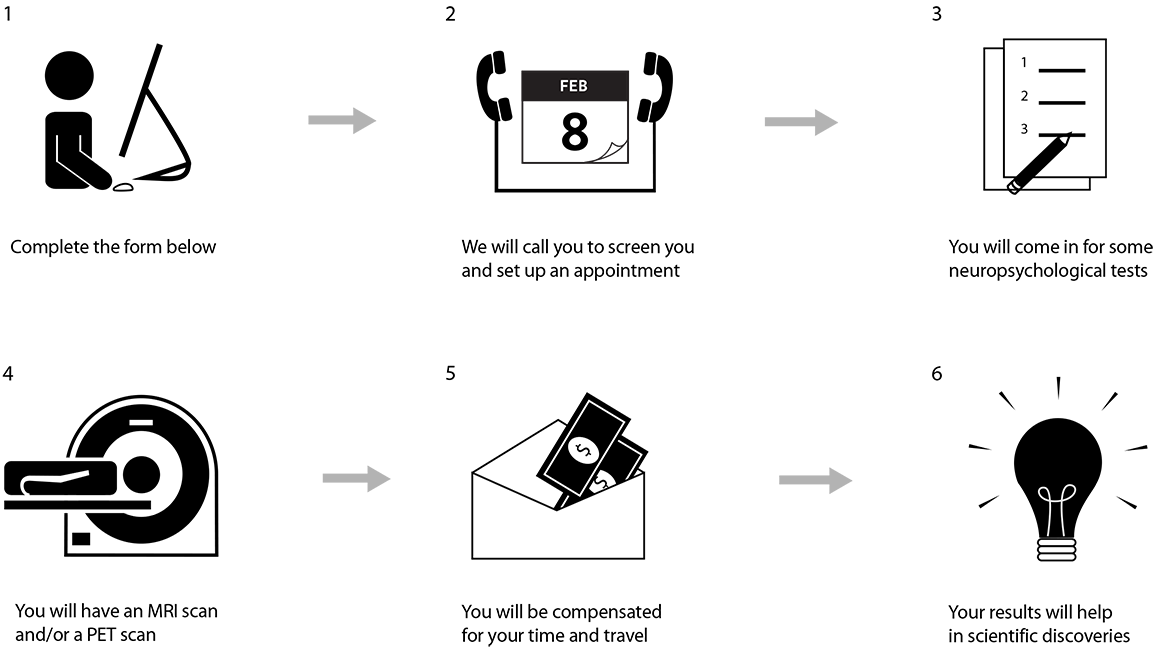What happens during an MRI?
This involves lying on a bed which slides into a large cylindrical magnet. Radio waves are used to obtain images from the internal parts of your brain. Before beginning the imaging procedure, you will be asked to remove any metal or magnetized objects (such as keys, chains, hairpins, and credit cards). If you have a pacemaker or any permanent metal implants like hip prosthesis (other than tooth fillings) you will not be able to participate in this study. You will be asked to breathe quietly and not move during the scan time. There is no pain or discomfort associated the MRI scanning itself. However, you will hear a banging noise during the scan. This is a normal sound produced by the by the MRI scanner and does not indicate that anything is wrong.
Is an MRI safe?
The only known risk or discomfort involved with MRI scanning is the use of radio waves. However,there is no evidence that the scan causes any biological harm. Some volunteers experience discomfort lying on their back for up to an hour, or from being in a small space. Some volunteers have been unable to complete the study because of these discomforts. If you should feel the need to leave the MRI scanner at any time for any reason, the study will be immediately stopped and you will be allowed to do so.
How long will I be inside the MRI?
You will be inside the MRI for between 1 and 2 hours, depending on which study you are enrolled in.
What happens during a PET scan?
You will receive an IV catheter and then an injection of a small amount of radioactive contrast used to collect images of your brain. After enough time has passed for this contrast to collect in the tissue in your brain (approximately 50 minutes), you will lie on a bed which slides into a cylindrical scanner. This will collect the energy being emitted by the radioactive tracer and allow us to form a 3-D image of your brain tissue and of a specific type of plaque deposited on it. You will be asked to relax and to move as little as possible during the scan and to breathe quietly. The scan should take 20 minutes to complete.
Is a PET scan safe?
The risks of receiving a PET scan are minimal. No side effects have been reported with such a low dose of radiation as used for the tracer. However, radiation exposure accumulates over your lifetime and it is impossible to know if the small amount of radiation you will be exposed to in this study could increase your long-term risk for diseases such as cancer. There is also a risk of an allergic reaction to the tracer, but this is unlikely. The most significant risks are pain and swelling resulting from the injection itself or the IV, but these should last only for a few days. Some participants report discomfort from being on their backs in a small scanner for 20 minutes. If you feel the need to leave the PET scanner at any time and for any reason, the study will be immediately stopped and you will be allowed to leave the scanner.
Do I have to do the PET scan to participate?
No. The PET scan is only performed in one of our studies, and you are only eligible to undergo the PET scan if you are between 60 and 70 years old. If you would prefer not to have the PET scan you can still participate in our other studies.
Will I be compensated?
Yes. Participants are compensated $80 per hour for each hour they spend inside the scanner (MRI or PET), as well as $15 per hour for each hour they spend participating outside of the scanner.
Can I be compensated for my travel?
Yes. Participants can be compensated for their travel costs upon presentation of appropriate receipts. If you are traveling by any means other than public transit, we will work with you to find the best method of transportation to our lab.
Am I informed of my results?
The results of your testing are typically not shared with you. However, should we and any information of medical interest or clinical significance from these procedures (e.g., brain abnormalities in the MRI scan), you will be informed.
Is my personal information kept confidential?
Yes. Any information obtained during this study and identified with you will remain confidential. Any information that may be of value to your physician for your personal treatment will be shared with your physician, unless you object to this. All information will be stored in locked files and all information in computer data bases will not have your name or any other identifying information associated with it.
Can I come in on weekdays/weekends?
Yes. We are very flexible and can accommodate almost any schedule. We do most of the sessions during the week (every day), but weekend sessions are also very common.
How many times do I have to come in/How long will it take to complete this study?
This depends on which study you are enrolled in. One study consists of four visits that last approximately 1.5 hours each. Another study consists of three visits that last between 1.5 hours and about 4 hours.
Where do I need to go?
We are located at Columbia University Medical Center at 168th St. and Broadway. If you choose to participate, we will provide you with very detailed directions to our lab upon scheduling.
